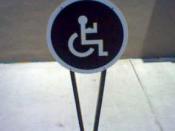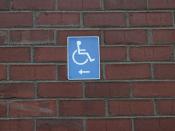BA Learning Difficulties/Disabilities
Session: 2009/2010
Semester: One
Subject: Psychological and Social Development (LG0901G)
Student ID: 0905405/0901361
Critically evaluate the Medical Model and the Social Model of Disability, as applied to people with learning difficulties/disabilities. Your answer should address how these models have developed over time.
Within the essay consideration should be given to the place of intelligence and labelling within each model.
Also discuss how each model affects the possibilities for inclusion amongst people with learning difficulties/disabilities.
Submissions must include Harvard referencing.
�
'Disabled' people are thought of by society as being inferior (Bochel et al., 2005); this essay will reflect upon some of the ways in which inequality for people with learning difficulties/disabilities has been explained over time. This concept of discrimination can be explored by questioning what is meant by the term 'disability', with reference to the ideas broached by both the medical and social models of disability.
Consequently, this essay will aim to evaluate how each model has affected the possibilities for inclusion amongst people with learning difficulties/disabilities.
There are diverse views on what the term 'disability' actually means. The medical model was predominately used to define and explain the term during the 20th Century. It supported the idea that the disabled person was the problem, not society. This model is sometimes referred to as the 'individual model', because the problem is deemed to be with the individual. In contrast, the social model of disability implies that it is society and an inaccessible environment which disables people, not their impairment (Oliver, 1983).
Medical explanations of disability are supported by 'science', with the eugenics movement essentially underpinning the medical approach to disability. The eugenics era, with the development of intelligence testing, was when disability was initially 'construed as an undesirable deviation from normal existence' (Snyder and Mitchell,


